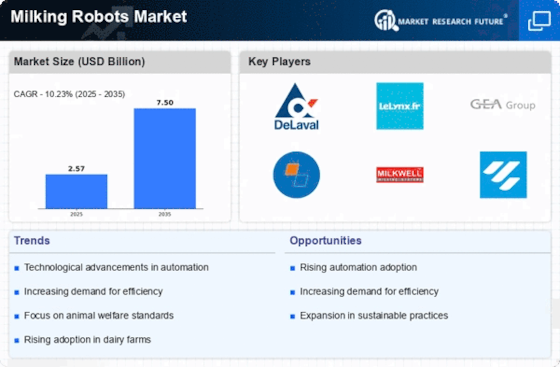Top Industry Leaders in the Milking Robots Market

Competitive Landscape of the Milking Robots Market
The milking robots market, encompassing automated milking systems that improve dairy farm efficiency and animal welfare, is experiencing significant growth driven by labor shortages, rising milk production, and increasing awareness of animal well-being. This market exhibits a dynamic competitive landscape with established players leading the charge and new entrants aiming for a share.
Some of the Milking Robots companies listed below:
- DeLaval
- Gea Group
- Lely
- Boumatic
- Fullwood Joz
- Christensen & Company
- Paul Mueller Company
- Milkomaz Dairy Solutions
- System Happel GmbH
- Waikato Milking Systems NZ LP
Strategies Adopted by Leaders:
- Technological Innovation: Continuous investment in R&D is crucial for staying ahead. Leaders focus on advancements in robotic arm design, udder recognition and attachment, milk quality monitoring, and data analytics to offer improved milking efficiency, animal comfort, and data-driven farm management.
- Product Portfolio Expansion: Recognizing diverse farm needs and sizes, leaders offer a range of milking robots with different stall configurations, milking speeds, and automation levels, catering to small, medium, and large dairy farms.
- Focus on Reliability and Uptime: Downtime in milking robots can significantly impact milk production and farm profitability. Leaders prioritize robust designs, rigorous testing procedures, and efficient after-sales service to ensure high reliability and minimize downtime.
- Sustainability Initiatives: Growing environmental concerns encourage the development of energy-efficient milking robots and sustainable practices throughout the production and maintenance life cycle. Leaders integrate energy-saving features and offer eco-friendly service options.
- Strategic Partnerships and Acquisitions: Collaborations with technology providers, farm management software companies, and financial institutions provide leaders with access to expertise, expand service offerings, and facilitate financing solutions for potential customers.
Factors for Market Share Analysis:
- Technology Leadership: Companies offering milking robots with advanced features, improved milking performance, and data-driven insights gain a competitive edge.
- Product Portfolio and Customization: A diverse product portfolio catering to various farm sizes and automation needs, along with the ability to offer customized solutions, is crucial for attracting and retaining customers.
- Brand Reputation and Service: A strong brand reputation built on product reliability, performance, and excellent after-sales service inspires trust and loyalty, leading to increased market share.
- Distribution Network and Customer Relationships: Established distribution networks and strong relationships with dairy farmers and farm equipment dealers ensure market reach and timely delivery of solutions.
- Total Cost of Ownership (TCO): While initial purchase costs are important, factors like energy efficiency, maintenance requirements, and service costs significantly impact the overall TCO. Companies offering competitive TCO attract cost-conscious farmers.
New and Emerging Companies:
Despite the dominance of established players, new and emerging companies are making their mark through:
- Niche Market Focus: Some target specific segments like smaller-scale dairy farms or organic farms with milking robots designed for specific needs and budgets.
- Cost-Effective Production: Utilizing innovative production methods or sourcing materials from cost-effective regions allows them to offer competitive prices, attracting budget-conscious customers.
- Agile Development and Innovation: Their flexible development processes enable them to quickly adapt to new technologies and market trends, offering innovative features and functionalities at a faster pace.
- Strategic Partnerships: Collaborations with established players or technology providers grant them access to resources, expertise, and distribution channels, accelerating their growth and market reach.
Latest Company Updates:
Mar. 13, 2023- DeLaval, a Swedish milking equipment manufacturer, announced its plan to invest in its automatic milking facility. The company aims to increase its production capacity of automatic milking machines to meet rising customer demand. Therefore, it is investing to increase its production capacity of automatic milking systems by 50%.
The investment will enable DeLaval to meet the growing customer demand and increase its production capacity while shortening lead times, ensuring a steady focus on product development and quality. On Sep.01, 2023, DeLaval, a Swedish milking equipment manufacturer, launched a new batch robot milking system.
Sep.25, 2023- GEA announced that it has further boosted the efficiency of its robots for milking large herds with a new system configuration on the DairyRobot R9500 automated milking system. GEA robots save energy and water, especially with large herds. The master-secondary configuration allows up to eight boxes connected to a single main milk line and up to 16 boxes to one tank, resulting in substantial energy and water savings in multi-robot installations. In May 2023, DLG initially assessed the consumption metrics of a GEA monobox system.
May 02, 2023- The University of Tennessee Institute of Agriculture introduced its new robot that can milk cows. The new system, developed by the Lely Corporation in the Netherlands, allows the automatic milking of cows in a stress-free environment. According to UT, the machine would make milking less stressful for farmers and cows. This automated milking machine makes farm production and milk production much easier. It allows farmers to use the technology efficiently and spend more time and resources with the herd.









